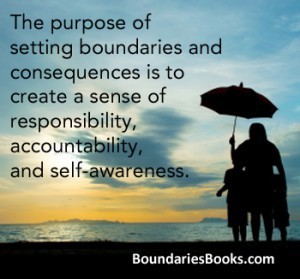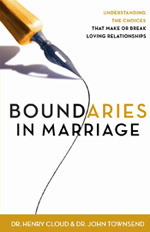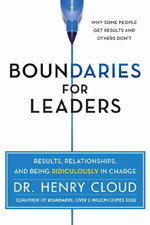Henry Cloud's Blog, page 27
November 24, 2014
How to Resolve Boundaries Problems with Family
 “You wouldn’t believe how she is with him,” Dan said. “She totally focuses on his every wish. When he criticizes her, she tries harder. And she practically ignores me. I’m tired of being the ‘second man’ in her life.”
“You wouldn’t believe how she is with him,” Dan said. “She totally focuses on his every wish. When he criticizes her, she tries harder. And she practically ignores me. I’m tired of being the ‘second man’ in her life.”
Dan wasn’t talking about Jane’s lover. He was talking about her father. Dan was tired of feeling like Jane cared more about her father’s wishes than his.
This is a common sign of a lack of boundaries with family: the spouse feels like he gets leftovers. He feels as if his mate’s real allegiance is to her parents. This spouse hasn’t completed the “leaving before cleaving” process; she has a boundary problem. God has designed the process whereby a “man shall leave his father and his mother and shall cleave to his wife; and they shall become one flesh” (see Genesis 2:24). The Hebrew word for “leave” comes from a root word that means to “loosen,” or to relinquish or forsake. For marriage to work, the spouse needs to loosen her ties with her family of origin and forge new ones with the new family she is creating through marriage.
This does not mean that husbands and wives shouldn’t have a relationship with their extended families. But they do need to set clear boundaries with their families of origin. Many marriages fail because one partner fails to set clear boundaries with family, and the spouse and children get leftovers.
Establishing boundaries with family is a tough task, but one with great reward. It is a process with nine distinguishable steps:
1. Identify the Need That Drives the Conflict
You do not act in inappropriate ways for no reason. You are often trying to meet some underlying need that your family of origin did not meet. Maybe we are still entangled because of a need to be loved, or approved of, or accepted. You must face this deficit and accept that it can only be met in your new family of God, those who are now your true “mother, father, brothers, and sisters,” those who do God’s will and can love you the way he designed.
2. Practice Boundary Skills
Your boundary skills are fragile and new. You can’t take them immediately into a difficult situation. Practice them in situations where they will be honored and respected. Begin saying no to people in your supportive group who will love and respect your boundaries.
When you are recovering from a physical injury, you do not pick up the heaviest weight first. You build up to the heavy stuff. Look at it as you would physical therapy.
3. Say No to the Bad
In addition to practicing new skills in safe situations, avoid hurtful situations. When you are in the beginning stages of recovery, you need to avoid people who have abused and controlled you in the past.
When you think you are ready to reestablish a relationship with someone who has been abusive and controlling in the past, bring a friend or supporter along. Be aware of your pull toward hurtful situations and relationships. The injury you are recovering from is serious, and you can’t reestablish a relationship until you have the proper tools. Be careful to not get sucked into a controlling situation again because your wish for reconciliation is so strong.
 There’s more to the process. Learn all nine steps to resolve boundaries problems with your family in Chapter 7 of Boundaries.
There’s more to the process. Learn all nine steps to resolve boundaries problems with your family in Chapter 7 of Boundaries.
The post How to Resolve Boundaries Problems with Family appeared first on Boundaries Books.
November 17, 2014
Do Not Obey Your Parents – Boundaries with Mom and Dad
 As an adult, loving and honoring your parents does not equal obeying. God placed you with your parents for a season of time to help you grow into a mature adult. At some point this season ends, and your relationship with your mom and dad changes from child-to-parent to adult-to-adult. The roles change from dependency and authority to mutuality. While you are to respect and care for your parents, you are no longer under their protection and tutelage. Children are to obey parents, while adult children are to love and honor them. Therefore, sometimes you will need to confront parents, disobeying their desire for you to agree with them or go along with a bad situation.
As an adult, loving and honoring your parents does not equal obeying. God placed you with your parents for a season of time to help you grow into a mature adult. At some point this season ends, and your relationship with your mom and dad changes from child-to-parent to adult-to-adult. The roles change from dependency and authority to mutuality. While you are to respect and care for your parents, you are no longer under their protection and tutelage. Children are to obey parents, while adult children are to love and honor them. Therefore, sometimes you will need to confront parents, disobeying their desire for you to agree with them or go along with a bad situation.
People often have difficulty confronting parents, because they still feel like a little child with them. Emotionally they have not left home, so they do not feel free to be separate, truthful, and honest with them. There is too much to lose. If this sounds like you, it might be very helpful to work on these issues in a small-group setting or with a counselor in order to free yourself up from the past so that you can be an adult in the present.
One concrete example of moving out of obedience and dependence on parents happens when you decide that you will not spend some traditional holiday time with your parents. This can often be a cause for a confrontational talk:
You: “Mom, I wanted to let you know as soon as I could that I’ve made plans to go to the mountains with some friends this Christmas. I know this will be the first Christmas I won’t be with you and Dad, so I wanted to talk to you about it.”
Mom: “What are you talking about? You always spend Christmas with us. Your father will be so hurt.”
You: “I’m so sorry you feel that way. I would never want to hurt you. But this year I have a really good group of friends from my singles group at church that I want to spend the holidays with. It’s not about not caring about you; it’s about wanting to be involved with these people at a deeper level.”
Mom: “Can’t you do that at another time? I mean, it will ruin our holiday.”
You: I hope it doesn’t ruin things for you. That’s why I’m telling you this several months in advance, so you can make sure you have time to make any other arrangements you need to so your holiday will be good.
Mom: “Don’t you care about how we feel?”
You: “Yes, Mom, I care very much. And I do like spending time with you. If you think that I don’t care, then maybe we can talk at some other point about your feelings, because I would like to reassure you that I care. But the point of this phone call was simply to give you a heads up so that we can plan and adjust for this change.”
In addition, don’t forget that your parent may need for you to be a change agent in her life. You may be one of the few people in her circle who is aware of her hurtful behavior or attitude. So, just as her job was to correct you in years past, your job (without the parental authority role) may be to correct her in the present. I know of many situations in which an adult child’s confrontation of a parent was life changing for both.
 The award-winning book, Boundaries, includes specific chapters dedicated to helping you solve problems with your family, children, spouse, friends, and co-workers. Learn how to set effective limits and still be a loving person. Boundaries make life better!
The award-winning book, Boundaries, includes specific chapters dedicated to helping you solve problems with your family, children, spouse, friends, and co-workers. Learn how to set effective limits and still be a loving person. Boundaries make life better!
Image courtesy of stockimages / FreeDigitalPhotos.net
The post Do Not Obey Your Parents – Boundaries with Mom and Dad appeared first on Boundaries Books.
November 10, 2014
8 Steps to Avoid Falling in Love Too Fast
 One of my (Dr. Townsend) closest friends, Chuck, is a talented songwriter. When we were college buddies, I was visiting him in his room one day. Chuck picked up his guitar and said, “Want to hear my new love song?” I said I did, and he sang me the following: “I love you. Always have, always will. What’s your name?”
One of my (Dr. Townsend) closest friends, Chuck, is a talented songwriter. When we were college buddies, I was visiting him in his room one day. Chuck picked up his guitar and said, “Want to hear my new love song?” I said I did, and he sang me the following: “I love you. Always have, always will. What’s your name?”
I never found out whether Chuck was referring to his dating history or simply observing college romantic life, but I knew I could identify with his lyrics. I understood the ritual of intense professions of undying love, followed by the realization of utter ignorance about one’s beloved. In other words, too much, too fast.
Relationships grow in a healthy manner only as they undergo experiences, and there is no shortcut to experiences. In other words, we only “know” each other to the extent that we have experience with each other. We can know facts about the person we are dating: their friends, job, hobbies, and so forth. But that doesn’t mean we “know” them as a person. That kind of “knowing” cannot come from reading a file on someone.
Experience requires time. It is simply impossible to get enough experiences under your belt without spending a lot of time dealing with the relationship. Here are eight necessary time-consuming activities on the road to becoming committed to someone:
Having enough talks to safely open up with each other
Entering each other’s worlds of work, hobbies, worship, and service
Meeting and spending time with each other’s friends
Understanding each other’s strengths and weaknesses
Going over basic values of what is important in life to each other
Getting to know each other’s families
Spending time away from each other to think through the relationship, alone and with friends
Learning your best style of disagreement and conflict management
It’s hard to imagine doing all these eight steps in a few months, because it can’t be done. Yet so many dreamy-eyed couples will say to their friends, “You don’t understand. It’s as if we’ve known each other all our lives. We were soul mates from the first meeting.” And, while I know people who have met and married quickly, I think their success is due more to their own character than to going through the process the right way.
For example, my Aunt Jonnie and Uncle Walton have been married over fifty years. I have seen his framed proposal of marriage to her. He wrote it to her when they were both in kindergarten! I guess they both knew each other was “The One” pretty early on in life. But I don’t think they would attribute their successful marriage to how early they committed. Knowing and observing them all my life, I think they would instead talk about love, the right values, their faith, and being able to go through good times and bad together.
There is no microwave dating that makes any sense. Use the eight steps to avoid falling in love too fast. Go through the seasons of life with the person you believe might be the one God has meant for you.
 Get more helpful advice to build the best dating relationship and find the love of your life in Boundaries in Dating by Dr. John Townsend and Dr. Henry Cloud.
Get more helpful advice to build the best dating relationship and find the love of your life in Boundaries in Dating by Dr. John Townsend and Dr. Henry Cloud.
“Men And Woman Hugging” image by photostock courtesy of FreeDigitalPhotos.net
The post 8 Steps to Avoid Falling in Love Too Fast appeared first on Boundaries Books.
November 6, 2014
Take the Boundaries Survey and Get the Free eBook – “Boundaries for the Holidays”
As someone interested in setting boundaries, your opinion matters to us. To better understand your needs, we appreciate you completing our brief, 5-minute, Boundaries Survey. Your honest responses will help us create new Boundaries products and reach more people with the life-changing message.
To say thanks for taking our survey, we want to give you the exclusive, 10-page, ebook for FREE:
 Boundaries for the Holidays
Boundaries for the Holidays
3 Ways to Enjoy the Holidays and
Prevent Your Family from Driving You Crazy
When you complete our survey, a website link will be displayed to copy and paste into your Internet browser to download your free ebook.
Click here to take our short survey
and get your free ebook
Take the Boundaries Survey and get the free gift that will help you manage awkward and frustrating family situations this Thanksgiving, Christmas, and New Years!
Sincerely,
The Boundaries Books Team
The post Take the Boundaries Survey and Get the Free eBook – “Boundaries for the Holidays” appeared first on Boundaries Books.
November 3, 2014
How to Set Consequences and Sturdy Boundaries
 Not long ago I (Dr. Townsend) took my kids and some of their friends to a major league baseball game for an outing. While we were watching the game, a young boy sitting behind us was making everyone miserable. He was out of control, loud, and rude.
Not long ago I (Dr. Townsend) took my kids and some of their friends to a major league baseball game for an outing. While we were watching the game, a young boy sitting behind us was making everyone miserable. He was out of control, loud, and rude.
His parents did try to manage him, but their efforts were ineffective. They shushed him, praised him when he was quiet, bribed him with food, and threatened to take him out of the game. Nothing worked.
Finally, one of my son’s friends turned to me and said, “That guy needs some serious consequences.” I made a note to myself to call his parents when I got home and congratulate them. I don’t often hear that kind of thing from adolescents.
If you are like many of the people I talk with, you may often have difficulty identifying and following through with appropriate consequences. Let’s take a look at a five simple principles that can guide you in determining the right consequences when setting boundaries.
1. Remove the Desirable, Add the Undesirable
A consequence is either removing the desirable or adding the undesirable to someone else’s life as the result of a rule violation. If you have a teenager, examples might include the removal of television privileges or the addition of extra chores.
In my experience, removing something other people want is usually more effective than adding something they don’t want. This is true for two reasons. First, many people today have a lot of extracurricular demands (sports, music, theater, church, and so on), so they have less free time to do whatever has been added to their already busy schedule.
Second, it requires more of your time and energy to supervise and monitor added responsibilities than it does to remove an activity. So, before you impose a consequence that involves adding something, make sure it is worth your personal investment.
2. Don’t Interfere with a Natural Consequence
Whenever possible, allow other people to face a natural consequence to an undesirable behavior or attitude. Don’t intervene. For example, allow the other person to:
Lose a relationship as a result of being selfish
Spend the night at the police station after being picked up for loitering late at night
Miss out on going to a movie, concert, or event as a result of having spent all their money
These types of consequences are powerful and effective. Even better, all they require from you is that you get out of the way! Of course, many situations do not have a natural consequence, and in those instances, you need to apply something of your own making.
3. Make the Consequence Something That Matters
A consequence must matter to the other person. He or she must be emotionally invested in it. She needs to want and desire what she is losing; she needs to not like what she is having to add. Otherwise, the experience doesn’t count for much. For instance, if you have a loner kid who loves her music, she likely won’t mind being restricted to her room with her stereo. That is why you need to know your own teen’s heart, interests, and desires.
This might lead some people to ask: What if nothing matters? You might be a parent who has tried everything, but your teen doesn’t really seem to care. Keep in mind that your teen may be engaging in a power play with you, holding out to see how far you will take this. If so, the consequences do matter to your teen, but she doesn’t want you to know, either because she’s so angry at you that she wants you to feel helpless. Or, she is waiting you out in hopes that you will drop the consequence. In these situations, you may need to talk with your teen about her anger and try to connect and defuse things while also keeping the limit going. In time, your teen will likely become aware that she is only hurting herself, and will begin to respond.
When you do see a positive response, be sure you are warm and encouraging with your comments. When people submit to a consequence, they often feel humiliated, weak, powerless, and alone, which puts them in a very vulnerable position. They need grace and comfort. So refrain from lecturing, making jokes, or showing that you were right. Treat others as you’d like to be treated in a similar situation.
4. Give the Most Lenient Consequence that Works
How severe is too severe? How easy is too easy? You’ll want to ensure that the consequences fit the violation appropriately. The time should fit the crime. When consequences are too strict, it can lead to alienation, discouragement, or increased rebellion. When they are too lenient, it can lead to increased disrespect and a lack of the desired change in the other person.
So, give the most lenient consequence that works. Keep your mind on the goal, which is a heightened sense of responsibility, accountability, and self-awareness. If a more lenient consequence changes behavior, and the change lasts over time, then you are on the right track. If it does not, and you are providing the right amounts of love, truth, and freedom, then you may want to increase the heat of the consequence over time until you see change.
5. Preserve the Good
Here’s another good rule of thumb: the best consequences matter the most, but preserve good things the other person needs. Impose consequences that are a big deal, but don’t remove activities that are good, such as participating in sports, taking music or art lessons, going to church, etc. These activities teach important lessons in discipline, cooperation, skill building, and coaching, and in so doing contribute to your child’s development or the other person’s growth.
 Is setting boundaries and determining consequences with your teenage son or daughter driving you crazy? Dr. John Townsend provides the expert insight you need to help your teens take responsibility for their actions, attitudes, and emotions while gaining a deeper appreciation and respect both for you and for themselves. With wisdom and empathy, Dr. Townsend, a father of two teens himself, applies biblically-based principles for the challenging task of leading your children through the teen years. With his guidance, you will be able to:
Is setting boundaries and determining consequences with your teenage son or daughter driving you crazy? Dr. John Townsend provides the expert insight you need to help your teens take responsibility for their actions, attitudes, and emotions while gaining a deeper appreciation and respect both for you and for themselves. With wisdom and empathy, Dr. Townsend, a father of two teens himself, applies biblically-based principles for the challenging task of leading your children through the teen years. With his guidance, you will be able to:
Deal with disrespectful attitudes and impossible behavior in your teen.
Set healthy limits and realistic consequences.
Be loving and caring while establishing rules.
Determine specific strategies to deal with problems both big and small.
Click here to read a sample chapter and purchase today
Image courtesy of artzsamui at FreeDigitalPhotos.net
The post How to Set Consequences and Sturdy Boundaries appeared first on Boundaries Books.
October 30, 2014
Setting Boundaries When You Feel Helpless
 Do you ever feel like you’re powerless to set boundaries in critical situations? What if someone else seems to hold all of the power in a relationship? Consider the biblical story of Daniel for answers:
Do you ever feel like you’re powerless to set boundaries in critical situations? What if someone else seems to hold all of the power in a relationship? Consider the biblical story of Daniel for answers:
Daniel 1:1-20 – “In the third year of the reign of Jehoiakim, king of Judah, Nebuchadnezzar, king of Babylon, came to Jerusalem and besieged it. And the Lord delivered Jehoiakim king of Judah into his hand, along with some of the articles from the temple of God…Then the king ordered Ashpenaz, chief of his court officials, to bring into the king’s service some of the Israelites from the royal family and the nobility—young men without any physical defect, handsome, showing aptitude for every kind of learning, well informed, quick to understand, and qualified to serve in the king’s palace. He was to teach them the language and literature of the Babylonians. The king assigned them a daily amount of food and wine from the king’s table. They were to be trained for three years, and after that they were to enter the king’s service.
But Daniel resolved not to defile himself with the royal food and wine, and he asked the chief official for permission not to defile himself this way. Now God had caused the official to show favor and compassion to Daniel, but the official told Daniel, ‘I am afraid of my lord the king, who has assigned your food and drink. Why should he see you looking worse than the other young men your age? The king would then have my head because of you.’
Daniel then said to the guard whom the chief official had appointed over him, ‘Please test your servants for ten days: Give us nothing but vegetables to eat and water to drink. Then compare our appearance with that of the young men who eat the royal food, and treat your servants in accordance with what you see.’ So he agreed to this and tested them for ten days.
At the end of the ten days, Daniel looked healthier and better nourished than any of the young men who ate the royal food. So the guard took away their choice food and the wine they were to drink and gave them vegetables instead. God gave knowledge and understanding of all kinds of literature and learning. And Daniel could understand visions and dreams of all kinds.
It would have been easy for Daniel to follow the king’s edict and eat foods that would have made them unclean. Instead he reviewed his options and made choices that allowed him to take control of his situation.
There are times in life in which we feel helpless or trapped. We may be in a relationship in which someone is controlling us. Or we may have a habit that is getting out of control. One of the best things we can do is to carefully consider our options. It is rare that we are totally helpless with no choices available to us.
Daniel, a prisoner with no rights of his own, made choices that helped him and protected his purity with God. Perhaps our choice is to voice our opinion, as Daniel did. Or it may be to ask for help. It doesn’t matter — the point is to be aware of our options and make good choices and then do the next right thing.
 Find more insightful commentary from Drs. Henry Cloud and John Townsend, read the NIV Life Journey Bible, which combines the world’s most accessible Bible translation with exclusive boundaries teaching.
Find more insightful commentary from Drs. Henry Cloud and John Townsend, read the NIV Life Journey Bible, which combines the world’s most accessible Bible translation with exclusive boundaries teaching.
Image courtesy of stockimages at FreeDigitalPhotos.net
The post Setting Boundaries When You Feel Helpless appeared first on Boundaries Books.
October 26, 2014
When Setting Boundaries Feels Scary
 A woman came to see me (Dr. Cloud) once for help in her marriage. She described her husband as so “powerful” and “intimidating” she just could not find it in herself to talk to him about things bothering her.
A woman came to see me (Dr. Cloud) once for help in her marriage. She described her husband as so “powerful” and “intimidating” she just could not find it in herself to talk to him about things bothering her.
“Why don’t you just talk to him about these things?” I asked.
“Oh, I just couldn’t do that,” she would reply. “He’s too strong. He’s so intimidating. I just don’t know what to do.”
After seeing I wasn’t getting anywhere by suggesting she talk to her husband, I asked her if her husband would come in to see me. She said she would tell him I would like to talk to him. I had no idea what I was in for.
On the day of her next appointment, I went into the waiting room to find the woman sitting there with a small, frail-looking man. He stood and said, in one of the least intimidating, squirrelly little voices I had ever heard, “Hi, Dr. Cloud. It is so nice to meet you!” I remember describing him later as “mousy.” He came across as just a whisper of a person.
I could see immediately that his wife and I had some work to do. I had to help her see where her distorted view of her husband as powerful and intimidating came from. After much work in counseling, we discovered that as a result of growing up with a powerful, intimidating, “unconfrontable” father, this woman saw all men she needed in the same way. She had never worked through her tendency to distort.
We all have such “transferences,” or tendencies to see people in light of past experiences. We distort authority figures, men, women, romantic ties, people’s neediness, and their imperfections.
In dating relationships, a woman will sometimes so idealize her boyfriend that she cannot even see the problems that need confronting. She idealizes him to the extent that she does not confront ongoing problems, and then there is a big blowup later. Or the “idealized” one loses interest because he has so much power in the relationship. Whenever someone is too idealized, the power imbalance is destructive to the connection; it will ultimately break down.
In some organizations, followers sometimes so idealize their leaders that they do not deal with ongoing issues and problems with them, then later they hate the leaders when they fail. The proverbial “other shoe” drops, and we find that the idealization covered up much anger and many problems. In the same way, we see others as “all bad” at times, and far from idealizing them, we have difficulty seeing their good points. In this situation, a confrontation becomes a lynching. The distortion arouses destructive rage, which is directed at the person who is “all bad” in the confronter’s eyes. (This happens in many romantic breakups, too.)
Another very common scenario is one in which someone who has been enabling another person is afraid to set limits because she fears it will destroy the person who is so “weak.” Obviously, when someone is in a vulnerable position, confrontation is not a good idea. If it could put the person “over the edge,” or if he truly would not be able to take care of himself, to cut him off would be cruel. But in many situations, a family is enabling someone to stay sick and dependent because they see him as too weak and unable. It is often time to clear up that distortion and see him as a fat little bird who needs to be pushed out of the nest so that he can learn to fly.
The point is this: Obtain a realistic view of the person you are talking to, and be aware of your tendencies to do the following:
Idealize and romanticize
See as “all good” or “all bad”
See as overly powerful
See as overly needy or fragile
See as a parental authority figure
As you become aware of your distortions, look also at the behaviors and choices these distortions lead you to make, and use that awareness to make the changes you need to make.
 Don’t let fear prevent you from being yourself and building the best relationships possible. You can set limits with other people and still be a loving person. Read the award-winning book, Boundaries, and learn when to say yes and how to say no in any situation.
Don’t let fear prevent you from being yourself and building the best relationships possible. You can set limits with other people and still be a loving person. Read the award-winning book, Boundaries, and learn when to say yes and how to say no in any situation.
Click here to purchase
Photo courtesy of stockimages at FreeDigitalPhotos.net
The post When Setting Boundaries Feels Scary appeared first on Boundaries Books.
October 23, 2014
Three’s a Crowd in Marriage
Marriage is an exclusive club meant to be a two-person arrangement, leaving out all other parties. This is why wedding vows often include the phrase, “forsaking all others.” Boundaries in marriage are meant to create a safe place for one’s soul; third parties can become disruptive to this safety.
 The problem is that love between spouses can often get segmented into other places. This problem, called “triangulation,” is one of the great enemies of good marriages. Triangulation occurs when one spouse brings in a third party for an unhealthy reason. A “triangle” is created when, for example, a wife (Person A) goes to a friend (Person C) for something that she should go to her husband (Person B) for. Or in a family setting, a sibling (Person A) calls you (Person C) to talk about “Mom’s problem,” without first talking to Mom (Person B). Here are some examples of triangulation that occur in marriage:
The problem is that love between spouses can often get segmented into other places. This problem, called “triangulation,” is one of the great enemies of good marriages. Triangulation occurs when one spouse brings in a third party for an unhealthy reason. A “triangle” is created when, for example, a wife (Person A) goes to a friend (Person C) for something that she should go to her husband (Person B) for. Or in a family setting, a sibling (Person A) calls you (Person C) to talk about “Mom’s problem,” without first talking to Mom (Person B). Here are some examples of triangulation that occur in marriage:
• A wife talks to her best friend about her unhappiness with her husband, but doesn’t let him know her feelings.
• A husband confides to his secretary that his wife doesn’t understand him.
• One spouse makes their child a confidant, becoming closer to the child than to her mate.
• A husband is more invested in his parents than in his wife.
In all these examples, a spouse is taking a part of his heart away from his mate and bringing it to an outside source. This is not only painful, but also unjust. It works against what God intended to develop in marriage—the mysterious unity that brings the couple closer to each other in ever-deepening ways. Triangulation betrays trust and fractures the union.
How do you prevent triangulation from affecting your marriage? Read the answer in the helpful article, “How Outside Parties Can Disrupt Relationships.”
More Must-Read Material: For a library of over 15 helpful articles on various boundaries topics, check out the Free Resources section of this website.
The post Three’s a Crowd in Marriage appeared first on Boundaries Books.
October 19, 2014
How Conflict Creates Connections for Couples
 When my wife, Barbi, and I (Dr. Townsend) were first married, we used to have conflicts about conflict. Looking back, it’s kind of funny as I later went on to write a Christian relationship book called Boundaries in Marriage. Imagine watching us have boundary conversations about how bad our marriage boundaries were. Barbi’s approach to conflict was to avoid it. My approach tended to be more blunt. We’d talk about a problem and it wouldn’t go well. One of us would misunderstand, we would pull away from each other, and the problem wouldn’t get solved.
When my wife, Barbi, and I (Dr. Townsend) were first married, we used to have conflicts about conflict. Looking back, it’s kind of funny as I later went on to write a Christian relationship book called Boundaries in Marriage. Imagine watching us have boundary conversations about how bad our marriage boundaries were. Barbi’s approach to conflict was to avoid it. My approach tended to be more blunt. We’d talk about a problem and it wouldn’t go well. One of us would misunderstand, we would pull away from each other, and the problem wouldn’t get solved.
One day, I asked Barbi, “When we argue, I never stop loving you. Is there anything I can do to make this better for you?” She thought a minute and said, “Maybe if you let me know you love me before you confront me, that might help.”
I thought that was a good idea, so I agreed. The next time I wanted to have a talk with her about a concern, I walked in the room and said something like, “Honey, I just want to let you know I really care about you and I hope you feel safe with me.” Then when I brought up the problem, things went better for her and for us.
This method of having successful conversations went on for a while. As time passed, however, something changed. I needed to bring up an issue, so I began with, “Honey, I just want you to know…” Barbi said, “Stop! It’s okay. I know you love me; just get to the problem.”
We had a good laugh about it. Over time, she had begun feeling safe enough not to need reassurance before each conversation. She realized that I love her even in the midst of confrontation, and she was ready to go straight to solving whatever problem needed to be solved.
When God created marriage, he gave us one of his best gifts. He provided a permanent and safe connection for a man and a woman to experience love, joy, meaning, and purpose together. Genesis 2:24 says, “For this reason a man will leave his father and mother and be united to his wife, and they will become one flesh.” God designed marriage to be a whole-person connection. This means that, more than in any other human relationship, every part of you ideally is to connect and cleave to every part of your spouse. The love you share should be complete as you intertwine your lives and emotions around each other.
Because marriage is such a wonderful type of relationship, confrontation within the marital relationship is very important. Who is better qualified to understand and speak to someone about a problem than the person who is living life right next to him? You are intimately involved with him. You see the real person, imperfections and all. His ways and actions affect you; you are not dispassionate about him. More than anyone, a spouse should be able to see what her partner’s true problems are.
Marriage is not about making each other happy; it is about growing and helping one’s spouse to grow. For instance, Ephesians 4:16 says good marriages are a large part of how the body of Christ “grows and builds itself up in love.” Happiness can and does come to a good marriage. Happiness, however, is a byproduct of growth and life. It is not the goal.
Confrontation brings empowerment, which is the ability to make choices and changes in your relationship. God created all of us to be change agents for each other. We have a responsibility to influence the people in our lives to be the best possible people they can be. For instance, 1 Thessalonians 5:11 says, “Therefore encourage one another and build each other up.”
Healthy confrontation helps us grow by making us aware of what we are doing and how our behavior affects others. God uses us to deliver the ingredients of growth to the people in our life. Part of the reason we are with whomever we are with is to provide those ingredients for those people. While most would agree that we can’t make someone change, it is also true that we can do much to encourage change.
As Barbi and I have learned to confront each other lovingly, directly, and effectively, we are often pleased in the change not only in our marriage but also in ourselves. We feel a sense of power that we can make changes and that we have choices. God designed all of us to connect and act, and confrontation helps put the “act” into the connection.
 If your marriage is struggling or you want to make a great marriage even better, Boundaries in Marriage has the answers. Learn how to:
If your marriage is struggling or you want to make a great marriage even better, Boundaries in Marriage has the answers. Learn how to:
Transform your relationship into a haven of mutual love, caring, and appreciation.
Protect your marriage from intruders, whether parents, affairs, or addictions.
Handle conflict effectively without losing your voice in the relationship.
Develop a sense of closeness and respect that you’ve never felt before.
Click here to read a sample chapter, watch a free video, and purchase your copy today.
The post How Conflict Creates Connections for Couples appeared first on Boundaries Books.
October 16, 2014
Boundaries for Leaders: Reversing the Death Spiral of a Leader
Enjoy this insightful video presentation by Dr. Henry Cloud entitled, “Reversing the Death Spiral of a Leader.” Dr. Cloud explains how to take leadership principles from theory to reality and prevent leaders from minimizing the effects of burn-out, bad decisions, and negative relationships.
 Click here to watch the video
Click here to watch the video
 Maximize your leadership potential by reading Boundaries for Leaders. Dr. Henry Cloud gives leaders the tools and techniques they need to achieve the performance they desire. Drawing on the latest findings from neuroscience, Dr. Cloud shows why it’s critical for leaders to set the conditions that make people’s brains perform at their highest levels. How do great leaders do this? One way is through the creation of “boundaries,” which are structures that determine what will exist and what will not.
Maximize your leadership potential by reading Boundaries for Leaders. Dr. Henry Cloud gives leaders the tools and techniques they need to achieve the performance they desire. Drawing on the latest findings from neuroscience, Dr. Cloud shows why it’s critical for leaders to set the conditions that make people’s brains perform at their highest levels. How do great leaders do this? One way is through the creation of “boundaries,” which are structures that determine what will exist and what will not.
Discover seven leadership boundaries that set the tone and culture for a results-driven organization, including how to:
Help people focus their attention on the things that matter most.
Build the emotional climate that drives brain functioning.
Facilitate connections that boost energy and momentum.
Create organizational thought patterns that limit negativity and helplessness.
Identify paths for people to take control of the activities that drive results.
Create high-performance teams organized around the behaviors that drive results.
Lead yourself in a manner that protects the vision.
Boundaries for Leaders will explain how leaders are ridiculously in charge of all these elements, and they must own what they either create or allow to exist.
Click here to purchase your copy.
The post Boundaries for Leaders: Reversing the Death Spiral of a Leader appeared first on Boundaries Books.



